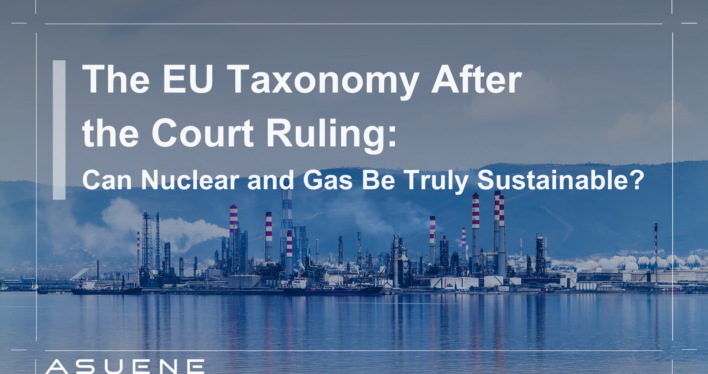- Article Summary
-
Introduction
The European Court of Justice (ECJ) recently upheld the European Commission’s decision to include nuclear power and fossil gas in the EU Taxonomy, the classification system designed to guide sustainable finance. This ruling has triggered heated debate among policymakers, investors, and environmental groups. On one side, proponents argue that nuclear and gas are necessary transitional tools for achieving Europe’s climate and energy security goals. On the other, critics claim that labeling these energy sources as sustainable risks undermining the credibility of the Taxonomy and amounts to institutionalized greenwashing. This article explores the context of the ruling, its policy and legal implications, the role of nuclear and gas in the energy transition, and what it means for investors navigating the sustainable finance landscape.
The EU Taxonomy Explained
The EU Taxonomy was created as a cornerstone of the European Green Deal to direct capital flows toward sustainable economic activities. Its core aim is to provide clarity and prevent greenwashing by defining which investments can legitimately be marketed as environmentally sustainable. The Taxonomy sets technical screening criteria across sectors to ensure alignment with the EU’s net zero targets. Initially focused on renewable energy, transport, and green technologies, it later expanded through the Complementary Climate Delegated Act to include nuclear and gas as transitional activities under strict conditions. These conditions include:
- New gas plants must replace more carbon-intensive coal.
- Gas facilities must meet strict emission thresholds.
- Nuclear projects must provide safe and effective waste management solutions.
- Both nuclear and gas projects must comply with EU environmental safeguards.
| Criteria | Nuclear | Gas |
|---|---|---|
| Primary role | Provide low-carbon baseload power | Serve as transitional replacement for coal |
| Emissions | Low operational carbon but long-term waste issues | Lower than coal but still fossil-based |
| Key condition | Demonstrated safe waste management and decommissioning plans | Must meet strict emissions thresholds and replace coal |
| Compliance | Must align with EU environmental safeguards | Must align with EU environmental safeguards |
The Court Ruling and Its Legal Significance
Austria, backed by Luxembourg and several NGOs, filed a lawsuit challenging the inclusion of nuclear and gas, arguing that the European Commission exceeded its legal authority. The European Court of Justice dismissed this challenge, ruling that the Commission acted within its delegated powers under the Taxonomy Regulation. This judgment confirms the Commission’s wide discretion in defining sustainability criteria, reinforcing the legal foundation of the Taxonomy. It also sets an important precedent: future disputes over what counts as sustainable will face a high bar in court. This strengthens the Commission’s ability to adapt the framework as technologies evolve, though it also raises questions about the balance between scientific objectivity and political compromise.
Nuclear and Gas in the Energy Transition
Nuclear power provides reliable baseload electricity with minimal operational carbon emissions, making it attractive for countries like France and Finland. However, it remains controversial due to unresolved issues around radioactive waste and high upfront costs. Gas, meanwhile, emits less carbon dioxide than coal and can complement renewables by offering flexible generation capacity. For many Eastern European states, gas is viewed as critical for energy security, especially in the wake of geopolitical tensions. Yet critics warn that new gas infrastructure risks creating carbon lock-in, delaying the full shift to renewables. Germany’s anti-nuclear stance and Austria’s opposition to both nuclear and gas highlight deep divisions among EU member states, reflecting different national energy strategies and political priorities.

Implications for Investors and Sustainable Finance
The inclusion of nuclear and gas complicates the landscape for investors who rely on the EU Taxonomy to identify green opportunities. On the one hand, it provides clear technical criteria that can help distinguish between genuinely transitional projects and unsustainable ones. On the other hand, it risks diluting investor confidence if stakeholders view the Taxonomy as politically compromised. ESG funds and green bonds may now include nuclear and gas projects, potentially attracting new flows of capital. However, some investors, particularly those with strict sustainability mandates, may exclude such assets, leading to market fragmentation. Globally, the ruling underscores the divergence between sustainability taxonomies, with the EU, UK, and Asia taking different approaches to nuclear and gas. For investors, this creates both opportunities and risks as they navigate overlapping and sometimes conflicting standards.
Conclusion
The EU Court ruling ensures that nuclear and gas remain part of Europe’s sustainable finance framework, at least for now. This reflects a pragmatic recognition of Europe’s current energy realities, but it also intensifies debates about the integrity of the Taxonomy. For policymakers, the challenge is to maintain credibility by enforcing strict technical criteria and updating them as technologies advance. For investors, the ruling signals both opportunities in transitional energy and risks of reputational backlash. Ultimately, the sustainability of nuclear and gas will depend not only on legal definitions but on their ability to contribute meaningfully to the EU’s long-term climate neutrality goals.
Why Work with ASUENE Inc.?
Asuene is a key player in carbon accounting, offering a comprehensive platform that measures, reduces, and reports emissions. Asuene serves over 10,000 clients worldwide, providing an all-in-one solution that integrates GHG accounting, ESG supply chain management, a Carbon Credit exchange platform, and third-party verification.
ASUENE supports companies in achieving net-zero goals through advanced technology, consulting services, and an extensive network.


